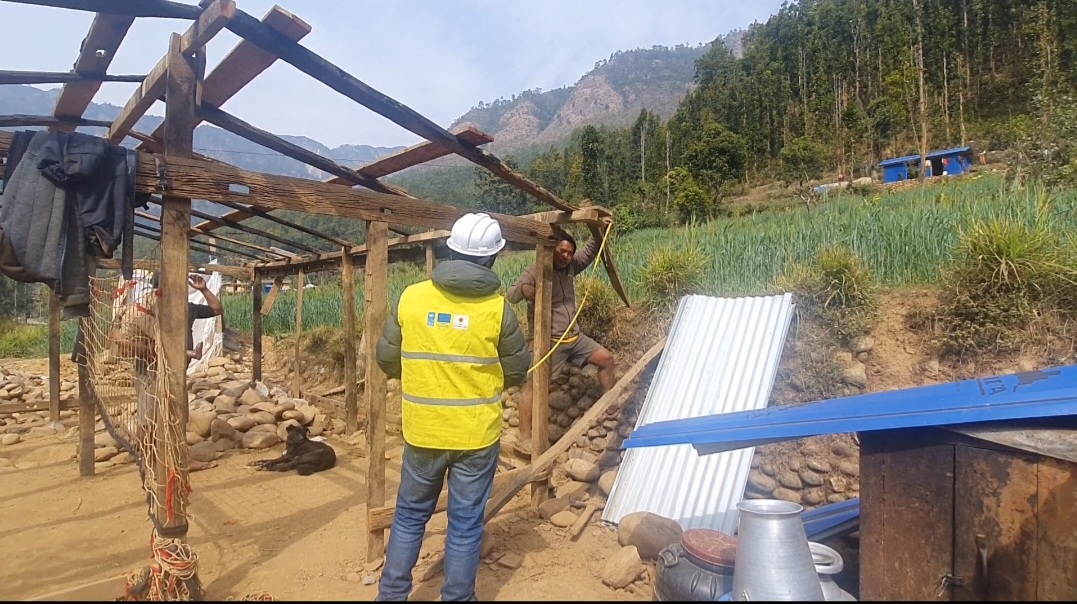Reflections on the earthquake recovery support
Sheltering Hope: UNDP's Response in Jajarkot
May 29, 2024

In the heart of Bheri Municipality, Jajarkot, Karnali Province, it's 11:30 a.m. and I'm eagerly waiting for the arrival of my colleague, Gururaj Sanjyal, a junior engineer at UNDP Nepal. Residing here for nearly two months since the 6.4 magnitude earthquake struck Karnali province in the western region of Nepal, I am stationed at the municipal office while Sanjyal's work often keeps him busy at the field.
Gururaj has been engaging in various tasks ranging from debris clearance to offering technical assistance to households grappling with the aftermath of the earthquake. Today, I tag along with Sanjyal to document his day, a day that often involves arduous journeys by foot or public transportation to reach the affected sites. We began our journey by heading towards one of our debris clearance sites, Peepe, Ward 1, Bheri Muncipality Jajarkot.
My work as an Information Management Associate mostly keeps me at the municipal office. I have been supporting the Local Disaster Management Committee (LDMC) at Bheri Municipality with data and information management post the earthquake.
Besides that, I have also been coordinating in UNDP’s recovery efforts within the municipality, which brings us to our joint mission in meeting the beneficiaries of debris clearance post the earthquake and providing them with technical assistance for temporary shelter construction if needed.
As we journeyed through the terrain, the earthquake's devastation remained evident but so did the community's resilience. While many homeowners have completed constructing their temporary shelters, a few households have yet to begin, highlighting UNDP’s recovery efforts in Jajarkot. UNDP Nepal provided technical support through Cash for Work modality to 100 households in Bheri Municipality. Further, 8 Information Management Officers were deployed to assist the provincial, district and municipal governments to facilitate smooth coordination and information management for response and early recovery efforts related to the earthquake.
UNDP has been working closely with the Government of Nepal and humanitarian partners, including the European Union Humanitarian Aid and the Government of Japan, to extend support to the earthquake affected people in Jajarkot and Rukum West through initial response and early recovery efforts. We are working across six municipalities in Karnali Province, including Barekot Rural Municipality, Nalgad Municipality and Bheri Municipality in Jajarkot District and Sani Bheri Rural Municipality, Musikot Municipality and Aathbiskot Municipality in Rukum West district. The key areas of UNDP support, in addition to information management and coordination support, to these select places include debris removal, conducting technical assessment, supporting basic service delivery, investing in disaster preparedness and emergency response.

Gururaj Sanjyal having a conversation with Kalpana Pun
For this visit, our focus shifts from supporting construction activities to ensuring beneficiaries face no issues with the structures they have built so far. Our first stop is at the residence of Kalpana Pun, a 41-year-old woman whose home became uninhabitable after the earthquake. Pun, a beneficiary of the debris clearance through Cash for Work, expresses gratitude for Sanjyal's technical assistance in understanding and adhering to the municipality's criteria for temporary shelter construction. "His guidance ensured our structure met the government's criteria," says Pun, relieved that mistakes would not jeopardize her shelter.
Furthermore, she adds that the Cash for Work approach was a much-needed help. “Although it was a small amount that we received, it was a motivating factor for us to dedicatedly work in clearing the debris as well as have some financial support in the time of crisis,” she adds, saying that we family couldn’t be happier to finally have some space cleared to construct their temporary shelter. “A huge burden was lifted off our shoulders.”
We continued our journey through the area, engaging with beneficiaries involved in debris management along the way, inquiring about the completion of their temporary shelters and addressing any issues encountered by them. Most people have already settled into their shelters, signifying a community in the healing and rebuilding process.

Gururaj Sanjyal giving technical assistance to one of our beneficiaries, Nabin Rana, during his temporary shelter construction.
After a thorough survey, we reach the residence of Nabin Rana, a 28-year-old diligently constructing his temporary shelter. While engaging in a light conversation, Sanjyal measured the shelter's area to ensure its alignment were according to the government criteria. He further provides Rana valuable tips, like constructing slopped instead of flat roof do avoid damage from wind or rain, to enhance his family’s safety and comfort especially with the looming monsoon season. "We have been building these shelters based on our knowledge. But advice from an expert helps us avoid many mistakes," says Rana, echoing the sentiments of many beneficiaries. Before our departure, Sanjyal reassures the family of a subsequent visit to ensure proper construction of their temporary shelter. By providing valuable expertise to the affected families, Sanjyal demonstrates UNDP's commitment to supporting the communities impacted by the Jajarkot earthquake.
As 3 p.m. nears, our scouting mission for aiding places comes to an end. After a quick meal, we wrapped up our journey around 4:30 p.m. Sanjyal's dedication was evident as his technical assistance left a lasting impact on 61 households in Wards 1, 2, and 11 of Bheri Municipality. Each home touched, each life changed, stood as a testament to his tireless dedication and the profound impact of his assistance.
Author
Anushka Nepal, Information Management Associate, Strengthening Urban Preparedness, Earthquake Preparedness, and Response in Western Region of Nepal (SUPER) Project

 Locations
Locations


